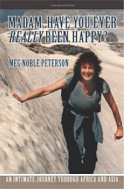Why did they have to call me, and not the kids? This wasn’t my job anymore. I was divorced. Hadn’t Glen tormented me enough with his alcohol abuse? Hadn’t his slow deterioration nearly consumed us all? Then I thought of the young adventurer backpacking through Europe on our honeymoon; the civic reformer; the scrappy newspaper editor; the man who, with me, took a dying company and breathed life into it….
Four months ago, Glen, my ex-husband, boarded a plane at Newark Airport. He was in the last stages of bone cancer and weighed less than ninety pounds. But he was terrified that he might die in a nursing home and never see the house he was building in Florida–for his retirement. So without telling his family, he locked the doors of his ranch house in Willingsboro, New Jersey, and paid a stranger to accompany him on the plane. He left his friends and grown children feeling perplexed, helpless, and abandoned–the final frustration in two years of trying to minister to an irascible, dying man.
I received a call from the Florida Department of Health shortly after Glen arrived there. He had been found in a motel near Tampa, unable to move or care for himself. Gutsy was the word they used, and stubborn. But nobody is allowed to die uncared for in that state, so Glen, by his impulsive behavior, had put himself where he most feared to be–in the care of others.
My fury at this turn of events was softened when the health officer asked if there was any significance to the carved wooden prayer wheel he clutched tightly in his hand.
“I bought it for him in Nepal two years ago,” I said. “He feels it helps him endure the pain.”
Suddenly, I heard myself say, “I’ll come immediately.” I feared what I would find, but I wanted to go.
The smell of urine hit me as I reached the second floor of the nursing home. People sat in front of the television with tubes attached to their bodies, staring vacantly–some moaning, some calling out. At first I walked right by the frail, emaciated man lying on the wheelchair chaise. But the dark eye blinders caught my attention. During his illness Glen used them to help him sleep during the day. Could this old man be my ex-husband? Long white hair, scraggly beard. Shocking–like someone out of the death camps. How had this happened so fast? Oh God, I prayed, don’t let my face betray me.
“Get me out of here,” Glen demanded. “Meggie, you can’t leave me here.” Even weak and dying, he still wanted control.
I rolled him outdoors into the bright sun, and we talked. I showed him pictures I had taken that morning of his new house, and promised to get him a television and a phone so he’d feel connected with the outside world until he regained his strength and could move. He seemed encouraged, and determined to continue his fight.
The next morning everything had changed. “I’ve lost heart,” he said, tears running down his cheeks. “I have no more projects, no more dreams. I want to die. Please help me, I beg of you….”
“Florida was an illusion,” he continued. “Coming here was a mistake. Please forgive me.”
“I already have,” I answered.
In the evening, when they came to put a tube in his nose because he refused to eat, I fell apart. As young people we had promised each other never to prolong our lives by artificial means if either of us became terminally ill.
“We are not in the business of helping people die,” said the floor nurse. “Our job is to keep people alive as long as possible. Do you want me to lose my license? Besides, he’ll die when his time comes.”
“How can his time come if you put a tube up his nose?” I cried. Here I was with no legal right to decide anything for Glen, but I stood between him and the nurse and refused to budge.
The head administrator was called. She looked at me and her eyes filled–she understood. “I’ll look into Hospice,” she said. “That’s our only alternative.
For the first time in two long years of pain and struggle Glen seemed to be at peace.
Molly, the Hospice coordinator, was very straight with him. She confirmed what he already knew–that the dying process had begun–and explained in detail what to expect as the body shuts down.
“We’ll oversee your medication and won’t force you to eat,” she said. “We’ll keep you as comfortable as possible so you won’t have to fight the pain. This will allow you to let go.”
“Will you tell me when it’s time?” Glen asked.
“That’s what you have to tell us,” she said, turning to me.
At that moment, when I started to share in Glen’s dying, my own healing began.
We talked about everything–his cremation, his memorial “bash,” his friends, his hopes for our five children. I don’t think I could be so frank about my imminent death, but it created a closeness that only comes with total honesty.
I was amazed that Glen never voiced anger or bitterness about his condition, nor complained about the pain. I could tell by his face how much he hurt–deep in his bones and on the almost transparent surface of his skin–and I tried to give him comfort by gently massaging his wasted body. Many years had passed since I wanted to be near him or touch him. Now it gave me great happiness.
But dying was not going fast enough, and Glen became impatient with each passing day. I arrived early one morning to be greeted by a scowl and the words, “You deceived me.”
“What do you mean?” I said.
“You promised I’d die, and I’m still here.”
“Glen, it’s only the fourth day. This is one thing I can’t do for you. You’re in control now. All I can give is support.”
“Meggie, don’t you understand? I want to be free. I want to walk, to run, to fly–like the birds on that wallpaper. Help me get there–right now.” His eyes were wild. He yanked at my arm.
His request seemed more than I could bear. But I had seen enough useless suffering. I was ready. I realized the truth of what I had so often heard, that dying is not so terrible–only dying alone and unloved.
“O.K.,” I said. “Close your eyes and let go. Try to relax completely. Allow love to flow through you.” I stood next to the bed, holding his hand tightly. His respiration was very low. He seemed to be concentrating hard. A preacher in the next cubicle droned on in a loud voice about the Lord Jesus.
Suddenly Glen opened his eyes and shouted, “Will you be quiet over there? Can’t you see I’m trying to die?”
And try he did, but death would not come.
The day before I left Florida, the nurses persuaded me to go to the beach. Large lizards scurried in all directions as I drove down the lonely road to the Gulf. Thirty years evaporated in an instant. I was young, and in love, and in Florida.
I walked on the beach, wading near the sea gulls, who stood at attention in the marsh grass. I remembered how Glen had stood with his arm around me, looking out to sea and imitating the squawk of the gulls, saying that he hoped he’d turn into one after he died. How we had laughed.
Suddenly, the gulls took flight, their shrill cries sending a shiver through me. I was physically and emotionally drained. But I had to get back to the nursing home. I feared that Glen would die while I was gone, or feel abandoned. Nothing but this dying seemed real.
The next morning he was awake when I arrived. “I think you’d better go,” he said, very gently. “I’ve been thinking about you all night, and I can’t seem to die while you’re here. I guess I don’t want to leave you.” Tears started to come. “I wish you luck in your writing–in everything.” His voice trailed off. I held his hand for a long time, then walked to the door and turned. He raised a thin arm, flexed his fingers in a farewell sign, and, smiling faintly, said, “See you around the campus.”
I stumbled out of the home and headed for the airport. What was I really crying about? The lost dreams? The “what should have beens?” The impossible question–how could I have changed it all? Now it was academic. It was over. We had caused each other a great deal of pain. But we had
also given each other a great many gifts along the way. Perhaps the greatest was these last ten days.
A week later I was sitting in the living room with my daughter and son-in-law. It was Glen’s sixty-seventh birthday, and I wondered if I ought to go back to Florida. Our sons had visited right after I left, and he seemed to be fighting back.
The phone rang. It was Molly. “Meg, Glen went very peacefully–half an hour ago. Said he was going to give himself a birthday present. He died holding my hand. The prayer wheel was in the other.”
I finally managed to speak. “I want you to have it, Molly.”
Winter has come and gone since Glen’s death, and I still find myself weeping when I least expect it. My thoughts are full of the happy years centered around a tall, curly-haired young man with small children–a boy at the airport riding on his father’s shoulders, a little girl taking turns building a block castle–and laughter, joyous laughter. The memories are still there, good and bad. But somehow, as if to protect me from my own folly, the bad ones are fading, diluted by the passage of time. I’ve officiated, with my children, at the dispersing of Glen’s possessions. I’ve watched books, papers, paintings, and furniture be sold or thrown away, many loaded with memories of my life, too. But only by going through this painful process am I now free to mourn, for the first time, my real loss–the one that occurred so long ago.

